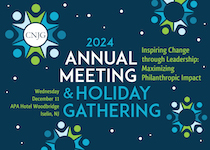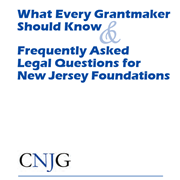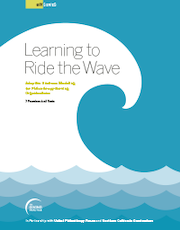Site Search
- resource provided by the Forum Network Knowledgebase.
Search Tip: Search with " " to find exact matches.
I can't believe October is already here! We are deep in planning for the CNJG 2024 Annual Meeting & Holiday Gathering, and I'm thrilled to invite you to be a part of this special event!
 Mark your calendars for Wednesday, December 11, as we come together at the APA Hotel Woodbridge with over 150 Council members and special guests to celebrate the holiday season, welcome new members, and host a brief business meeting to elect trustees. It's also the perfect time to connect with colleagues and friends, old and new, while participating in a thought-provoking discussion about the ever-important topic of leadership in philanthropy.
Mark your calendars for Wednesday, December 11, as we come together at the APA Hotel Woodbridge with over 150 Council members and special guests to celebrate the holiday season, welcome new members, and host a brief business meeting to elect trustees. It's also the perfect time to connect with colleagues and friends, old and new, while participating in a thought-provoking discussion about the ever-important topic of leadership in philanthropy.
This event is the one time each year where New Jersey’s philanthropic community comes together to connect, network, learn, and celebrate our collective work. It's a time to reflect on our impact, recharge with new ideas, and plan for the year ahead. Guided by the CNJG Signature Program Committee’s vision for this event, our focus this year is on leadership: Inspiring Change through Leadership: Maximizing Philanthropic Impact. Our morning workshop will explore the New Jersey Principles for Philanthropy – our equity principles emboldening leadership in action, followed by our keynote presentation featuring Amalia Brindis Delgado, Chief Strategy Officer, Panta Rhea Foundation, focused on transformative leadership transitions. It's a topic that feels more important than ever, and I can't wait for the conversations it will inspire.
The Annual Meeting is truly a highlight of the year. In addition to your participation, I invite you to consider supporting the Annual Meeting of Members through a sponsorship, grant, or contribution. Whether you've sponsored before or are considering it for the first time, this is an incredible opportunity to show your support for CNJG, while also raising visibility for your organization. We offer a variety of sponsorship options to fit any level of interest, and we're happy to tailor a package to meet your needs. Your support would help underwrite this vital event, ensuring it continues to serve as a place where our sector can grow stronger together. It's a valuable opportunity not only to give back to CNJG, but to highlight your commitment to the philanthropic community and its ongoing work in New Jersey.
If you'd like more information regarding sponsorship, please reach out to me via e-mail.
A big thank you to our sponsors to date - we couldn't do this without you! Special thanks to Signature Sponsor – Prudential; Contributing Sponsors – Devils Youth Foundation and Robert Wood Johnson Foundation; Supporting Sponsor – Grunin Foundation; and Colleague Sponsor – Horizon Blue Cross Blue Shield of New Jersey.
Thank you for your continued engagement with CNJG. I'm looking forward to hearing from you soon and can't wait to see you at the CNJG Annual Meeting & Holiday Gathering in December. Until then, enjoy the beauty of fall!
Warmly,
Theresa Jacks, President and CEO
Council of New Jersey Grantmakers
"Co-Creation" is a case study about the Connecticut Early Childhood Funder Collaborative, a project of the Connecticut Council for Philanthropy. The case study, written by Patricia Bowie, examines co-creation, an emerging systems change collaboration model which grew out of a funder-and-state partnership. This unique partnership led to the creation by executive order of a new and independent Office of Early Childhood, which was formally approved by the Connecticut State Legislature in 2013. The companion piece, "Taking on New Roles to Address 21st Century Problems," looks at co-creation from the perspective of a regional association of grantmakers.
The Connecticut Early Childhood Funder Collaborative comprises 14 funders from around the state who bring many years of experience in supporting and operating programs that serve the needs of children and families.
Six million immigrants in the US have jobs that could increase their risk of contracting the virus -- from physicians and home health aides to agriculture and food production workers. Another 6 million work in areas that have suffered major financial loss, including the restaurant and hospitality industry, in-home childcare, agriculture, and building services.
Yet, documented and undocumented immigrants are ineligible for federal relief funds and government-sponsored safety-net programs. Many “essential” workers lack health insurance. Language barriers often make getting services difficult. And, fear of repercussion if they test positive for COVID or uncertainty around immigrant policies prevent many immigrants from even seeking assistance.
During this webinar briefing, we will hear from Abel Rodriguez, Director for the Center on Immigration and Assistant Professor of Religion, Law, and Social Justice at Cabrini University and Sara Cullinane, Director of Make the Road New Jersey.
Topics will include:
• How immigrants and their families have been impacted by COVID, nationally and in our state.
• Supporting immigration policies and programs that advance the social and economic well-being of immigrant populations.
• Efforts in New Jersey communities to provide direct support, education, and other needed resources to immigrants during the pandemic.
Nearly 1 in 4 New Jersey residents is an immigrant. And despite their vital importance to this state and our country’s culture and economy, immigrants are often left out of programs and denied services that are critical for recovery. Join us for an important briefing on why your organization’s response to COVID must uplift immigrants and their families – now and for the future.
Cost: Free for CNJG Grantmakers. $50 for Non Member Grantmakers
Webinar Video
Sample board committee descriptions, including roles and responsibilities of committee members
To answer the basic question of how many active family foundations are planning to spend down or exist in perpetuity (or have not yet made a decision), and to examine foundations’ motivations and decision-making, the Foundation Center, in collaboration with the Council on Foundations and with additional assistance from the Association of Small Foundations, launched a study of family foundations in 2008. This report presents the full range of study findings, which are based on survey responses from 1,074 family foundations.

This guide was designed to help the state’s philanthropic community understand their ethical, legal, and fiduciary requirements and obligations.
In March 2024, Governor Murphy signed into law significant reforms to the ways that New Jersey enforces municipal affordable housing obligations under the state Supreme Court Mount Laurel doctrine. The new law creates enhanced affordable housing opportunities for New Jersey’s low-and moderate-income households, while seeking to streamline the affordable housing development process by setting clear guidelines for determining housing obligations. It is expected to reduce legal costs and judicial involvement. Join Adam Gordon, Executive Director and Emily Devenney, Grants and Development Manager of the Fair Share Housing Center for a conversation about what this new legislation means for philanthropy.
Since the revival and improved enforcement of the Mount Laurel Doctrine in 2015, New Jersey has seen a considerable increase in affordable housing production. However, there remains a substantial shortage of affordable homes in the state, particularly for very low-income residents. The legislation aims to address this gap by ensuring that every municipality contributes its fair share of affordable housing.
Key features of the legislation include a streamlined process for determining affordable housing obligations, codification of methodology for calculating these obligations, increased transparency in the housing development process, and the repeal of the state Council on Affordable Housing (COAH). Additionally, the legislation prohibits wealthy towns from avoiding their housing obligations through regional contribution agreements.
Cost: Free for CNJG Members; $50 for Non Member Grantmakers
Adam Gordon is the Executive Director of FSHC and leads FSHC’s coordinated strategy of organizing, litigation, and policy development to advance racial, economic, and social integration throughout New Jersey and the United States. Since joining the organization in 2006, he has worked to implement the Mount Laurel Doctrine which has created over 70,000 affordable homes in historically exclusionary NJ communities, litigated the largest federal fair housing case in American history, and worked to make federal disaster recovery policy more equitable. Under his leadership FSHC has secured the passage of the first statewide Fair Chance in Housing Act to limit discriminatory tenant screening policies and a landmark $305 million fund to accelerate affordable housing development. Gordon holds a B.A. and J.D. from Yale University.
Emily Devenney joined Fair Share Housing Center as the Grants & Development Manager in January 2024. She comes with experience in fundraising and community organizing, and strong connections to South Jersey, where she was born and raised (and likely will never leave). Emily has a B.A. in Economics and a Masters of Public Policy from the University of Massachusetts Amherst and a Certificate in Fundraising from Villanova University.
Webinar Video
Grantmaking at the Crossroads is a workbook designed to provide foundations with a new grantmaking methodology that works at the intersection of place, population, and issue. It offers a pathway to greater inclusion of communities that are often excluded or marginalized by foundation funding and enables foundations to maintain their focus and priorities while expanding their reach and effectiveness.
The Grand Rapids Community Foundation and the Kalamazoo Community Foundation volunteered to be laboratories for Grantmaking at the Crossroads and have been critical informants for this workbook. Each of these foundations holds an unwavering commitment to ongoing learning; this publication would not have happened without their support and engagement and the financial support of the Arcus Foundation.

Developed in partnership with United Philanthropy Forum and Northern California Grantmakers, this guide shares seven practices and 12 tools for Philanthropy-Serving Organizations who seek effective ways to mobilize resources to sustain their organization’s work. The guide features perspectives from dozens of leaders of national and regional PSOs and examples from our work with these organizations. Much of the content is based on conversations and strategy work with PSO leaders, staff and board members.
Resources gathered from our colleagues at other philanthropy-serving organizations, state nonprofit associations, and city, state, and federal governments.
Philanthropy Serving Organizations Resources
Candid: Funding Summary for Global Philanthropic Response
Center for Disaster Philanthropy
Disaster Philanthropy Playbook
Complex Humanitarian Emergencies: Philanthropy’s Role in Recovery Webinar - Held 2/13/2020
COVID-19 Coronavirus: How Philanthropy Can Respond Webinar - Held 3/5/2020
COVID-19: Past Epidemics and Vulnerability - Lessons for Funders Webinar and Webinar Slides - Held 3/26/2020
COVID-19: Making Effective Rapid Response Grants Webinar and Webinar Slides - Held 4/14/2020
COVID-19: Managing Multiple Disasters Amid the Pandemic Webinar - Held 4/28/2020
Report: Philanthropy and COVID-19 in the First Half of 2020 - May 2021
Report: Philanthropy and COVID-19 Measuring One Year of Giving - March 2021
Report: Philanthropy and COVID-19 Examining Two Years of Giving - May 2022
Center for High Impact Philanthropy: COVID-19 Pandemic: Resources
Council on Foundations
Philanthropy’s Response to Coronavirus Outbreak Resource Page
Sharing Approaches to COVID-19 Community Response Webinar and Webinar Slides - Held 3/12/2020
Funders: Sign the Council on Foundations’ Pledge to act with urgency, loosen restrictions, reduce what you ask of non-profits, contribute, communicate, and listen.
Exponent Philanthropy:
Resources for Lean Funders
Blog: How Lean Funders Are Responding to COVID-19
Funders Together to End Homelessness:
COVID-19 Response and System Redesign: Recommendations for Philanthropy to Support Solutions to End Homelessness
Grantmakers for Effective Organizations: Smarter Grantmaking Practices During—and Beyond—COVID-19
Minnesota Council on Foundations: Coronavirus Webinar and Webinar Slides - Held 3/4/2020
National Center for Family Philanthropy
COVID-19: Response and Recovery Resources
Family Philanthropy’s Response to COVID-19 Webinar - Held 3/27/2020
National Center for Responsive Philanthropy: Local Foundation Funding for Immigrant & Refugee Groups
Philanthropy New York
COVID-19 Updates & Resources
Preparing for COVID-19: Philanthropy’s Response in Times of Crisis Webinar - Held 3/12/2020
Philanthropy Network of Greater Philadelphia: Philanthropy’s Response to the Coronavirus
United Philanthropy Forum
3/12 Letter to Congress - Include Nonprofits in Coronavirus Package
3/18 Letter to Congress - Nonprofit Community COVID-19 Stimulus Letter
State Nonprofit Association Resources
New Jersey Center for Nonprofits: Resources for Non-Profits in Response to the COVID-19 (Coronavirus) Outbreak
1st Rapid Response Survey Report
2nd Rapid Response Survey Report
Washington Nonprofits: Open Letter to Funders
Government Resources
Center for Disease Control and Prevention: Coronavirus Disease 2019 (COVID-19)
City of Newark: News & Updates
Federal Emergency Management Agency: A Guide to the Disaster Declaration Process and Federal Disaster Assistance
NJ Department of Health: Up-to-date Information about the Coronavirus (COVID-19) in New Jersey
State of New Jersey: COVID-19 Information Hub
U.S. House of Representatives: House passes HR 6201: Families First Coronavirus Response Act
World Health Organization: Coronavirus disease (COVID-19) outbreak
Additional Resources
Condon O’Meara McGinty & Donnelly, LLP: Guidance for Private Foundations
Horizon Blue Cross Blue Shield of New Jersey, through its philanthropic arm, The Horizon Foundation for New Jersey, issued $555,000 in grants to 15 non-profit organizations for health, cultural programs and disaster relief throughout New Jersey during the third quarter of 2021.
The Foundation’s mission is to support organizations that make New Jersey healthier.
A total of $50,000 in disaster relief grants was awarded to the following organizations to support designated FEMA disaster areas and fill the gaps in the response effort:
- $25,000 to Community FoodBank of New Jersey
- $25,000 to ReNew Jersey: Ida Relief
Other grants issued in the third quarter include:
AtlantiCare Foundation, through the Community Foundation of New Jersey, in Morristown, received a $50,000 grant to support the Atlantic City Patient Transportation project, which provides free, easily accessible and reliable transportation for low-income patients in Atlantic City, using the health system’s services.
Diabetes Foundation, in Hackensack, received a $30,000 grant to support Improving Health Outcomes through Education and Guidance, a prevention and education program provided in English and Spanish, for patients with pre-diabetes and diabetes.
Food Bank of South Jersey, in Pennsauken, received a $25,000 grant to support Prevent T2, an evidence-based intervention for seniors designed to delay and/or prevent the onset of Type 2 diabetes.
Garden State Equality Education Fund, in Asbury Park, received a $25,000 grant to support the Adverse Childhood Experiences (ACEs) Self-Healing Community Model, which addresses the impact of trauma and ACEs on mental and physical health among LGBTQ+ and other marginalized communities in Camden.
George Street Playhouse, in New Brunswick, received a $75,000 grant to support the production of Anytown, a musical drama for students in grades 7-12, focusing on the challenges and consequences of opioid abuse and its impact on teens and families.
Greater Newark Health Care Coalition, in West Orange, received a $50,000 grant to support the Greater Newark Community Health Worker (CHW) Learning Collaborative, a project that promotes the growth, leadership and interconnections of CHWs in the Greater Newark region through monthly meetings, resource sharing and training.
Hopeworks ‘N Camden, in Camden, received a $20,000 grant to support Returning Stronger, which is focused on the development of a youth-built, youth-focused, easy-to-access website, to help young people find relevant mental health resources.
Mercer Council on Alcoholism & Drug Addiction, in Trenton, received a $20,000 grant to support the Community Oriented Recovery Effort (CORE), a pilot project to create and promote a larger, more inclusive space for those in the recovery community in Trenton and the surrounding area.
Millhill Child and Family Development Corporation, in Trenton, received a $20,000 grant to support Eat Right, Keep Moving, an obesity education and prevention program that aims to build a Culture of Health within the communities that Millhill serves.
Newark Boys Chorus School, in Newark, received a $40,000 grant to support the school’s music and concert touring programs, as well as academic initiatives.
The Newark Museum of Art, in Newark, received a $100,000 grant to support The Horizon Foundation Community Days, which occur once a month and provide free diverse programming for all ages.
Saint Vincent Academy, in Newark, received a $25,000 grant to support the Horizon Blue Cross Blue Shield of New Jersey Leadership Promise Scholarship, which provides one four-year scholarship to a Greater Newark-area student.
St. Benedict’s Preparatory School, in Newark, received a $25,000 grant to support the Steven Grossman Student Counseling Center, which provides students with mental health education, resources and services.
Despite a field replete with research, analysis, recommended policies and practices — not to mention an abundance of educational programs and frameworks for grantmaking to diverse communities — philanthropic leaders have been slow to advance these values in their foundations. Philanthropy Northwest (PNW) wondered: what is getting in the way? Why are good intentions, buttressed with theory and practical advice, not achieving better results on measures of diversity, equity and inclusion?
With the support of the D5 Coalition, PNW began a year-long study to explore these questions. The study was divided into two parts. They began with personal interviews of 23 philanthropic leaders in the Pacific Northwest. In order to better understand how these organizations incorporated diversity, equity, and inclusion into their work and workplaces, they collected baseline information about their staff composition, leadership styles, and organizational practices/policies.
This report details their findings. It includes an in-depth look at the peer cohort model, in which ten foundation leaders met regularly to discuss these issues and support each other in advancing their own leadership. It also includes practical lessons about shifting organizational cultures towards greater diversity, equity and inclusion — lessons drawn directly from the experiences of peer cohort leaders.
PNW presented this work in a webinar hosted by the D5 Coalition. The webinar recording and slides are below.
